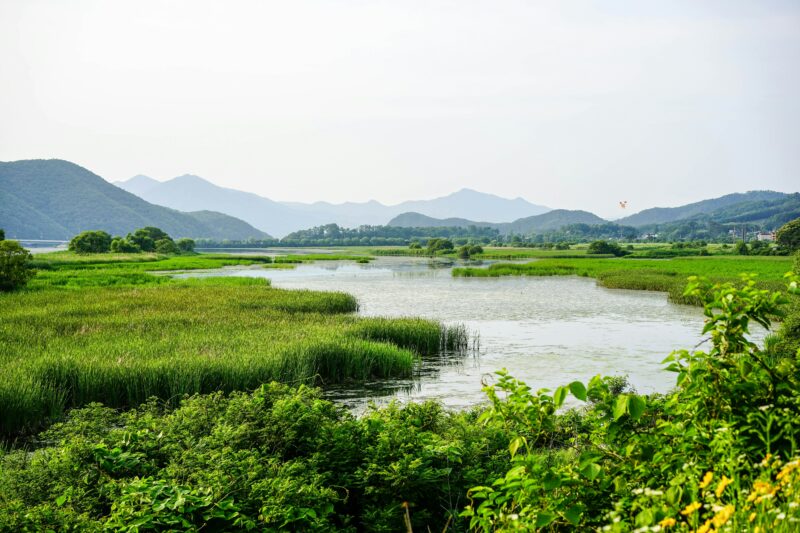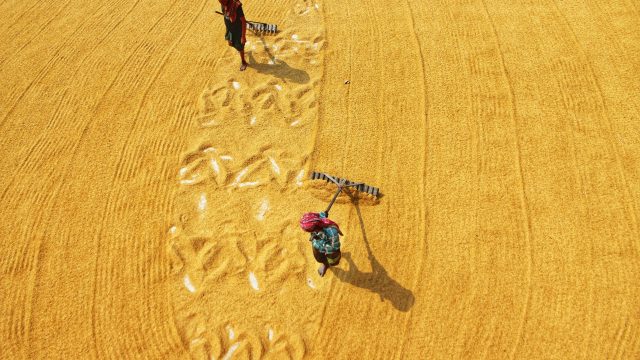Safeguarding Our Future: ACODE’s Pioneering Work to Protect the Wetlands and River Rwizi
Hear how ACODE Uganda are empowering change and engaging local communities for a more sustainable future.

To mark last week’s World Wetlands Day, we want to spotlight the critical environmental conservation efforts of our country hub partner in Uganda, the Advocates Coalition for Development and Environment (ACODE). ACODE’s work in preventing further degradation of the wetlands and safeguarding the River Rwizi is of vital importance, and their commitment to engaging local communities and groups underscores the belief that lasting positive change is a collective effort.
The Vital Role of Wetlands
Wetlands are not just water bodies; they are the lifeblood of local ecosystems, providing essential services from water purification to flood protection. This can be seen along the banks of the River Rwizi in Western Uganda, where water from the river is utilised for drinking and sanitation, plants and animals for harvesting and hunting, and mud and sand for construction.
Despite their importance, wetlands face unprecedented threats from pollution, encroachment, and unsustainable agricultural practices. The River Rwizi, a lifeline for thousands, is no exception, suffering from degradation that jeopardises both biodiversity and human livelihoods.
ACODE’s Mission
ACODE has been at the forefront of the battle to reverse this trend in Uganda and across East Africa. As such, the think tank has worked closely with Uganda’s Ministry of Water and Environment to develop the ‘Rwizi Catchment Management Plan’, and now oversees the implementation and evaluation of the Management Plan.
Their approach is multifaceted, combining scientific research, policy advocacy, and on-the-ground conservation efforts. Here are some of the key initiatives:
- Research and Advocacy: ACODE conducts in-depth environmental research to inform policy recommendations. Their findings serve as a foundation for advocating sustainable management practices that protect wetlands.
- Collaboration for Conservation: ACODE works in partnership with local government agencies, non-governmental organizations, and community groups. These collaborations ensure a unified approach to conservation, leveraging their strengths of each stakeholder.
- Community Engagement: Recognising that the health of the River Rwizi and surrounding wetlands is intrinsically linked to the practices of local communities, ACODE has prioritised engaging with these groups. Their efforts include education on sustainable farming techniques, the importance of wetlands, and how communities can contribute to conservation efforts.
The Necessity for Local Engagement
ACODE’s dedication to involving local people and community groups is based on a simple yet profound understanding – conservation efforts cannot succeed in isolation. The active participation of those who live closest to the wetlands ensures not only the sustainability of these initiatives, but also fosters a sense of ownership and responsibility towards natural resources.
In line with this, ACODE has spear-headed a number of activities geared towards restoring River Rwizi and other river systems.
Community Engagement Meetings
ACODE have planned Community Engagement Meetings with the communities around the river systems to build their capacity and increase community ownership and participation in river systems management and biodiversity conservation. As part of these efforts ACODE has also brought key stakeholders together with local elected leaders and councillors, and worked with them to develop a Civic Engagement Action Plan which seeks to encourage accountability around the fulfilment of sustainability and conservation policies.
Anna Amumpiire, a Research Fellow at ACODE shared “Poverty is a major driver of degradation, so community ownership is critical because without it the [local people] will continue to degrade the catchment area. This includes promoting alternative livelihoods, innovations and strategies which will be a key component as we think about creating social contracts.”
On the point of promoting alternative livelihoods, the team have highlighted that many of the people who live in and around the catchment area are heavily reliant on activities that degrade the wetlands to make a living. This creates a vicious cycle of dependency and degradation of ecosystems that can only end up impoverishing both the natural world, and the communities that depend on it. To address this challenge, they seek to promote alternative sources of income for these poor communities.
“ Poverty is a major driver of degradation, so community ownership is critical because without it the [local people] will continue to degrade the catchment area.”
Collaboration with the Ministry of Finance
ACODE is a member of the Ugandan Ministry of Finance’s National Task Force to develop a national financing strategy for climate change. All the activities outlined above require funding, so being part of this network allows the group to advocate for opportunities and initiatives that support green financing, and to provide necessary input that can feed into the budgeting process at both a national and local level.
Mbarara Green Enterprises Association
The Mbarara Green Enterprises Association consists of over twenty local small-scale green enterprises that are working to restore the integrity of the River Rwizi, as well as promoting alternative and complimentary business models that do not undermine the integrity of the river, but rather strengthen its restoration.
These enterprises are engaged in sustainable practices such as fish farming, tree planting, and the use of recycled plastics to produce alternative products. Not all small green enterprises in Mbarara are able to access financing, so one of the key goals of the association is to create opportunities for small, green enterprises to access investment and start-up capital that wouldn’t otherwise be afforded to them.
ACODE have worked with the Uganda Development Bank to establish a Climate Financing Unit that can enable small and medium enterprises to access seed funding via grants, allowing viable green businesses support to establish themselves within the formal business finance ecosystem.
The Path Forward
ACODE’s work in protecting the wetlands and the River Rwizi is a powerful reminder of our collective responsibility towards the planet. By engaging local communities and advocating for sustainable policies, they are laying the groundwork for lasting environmental stewardship.
- Ife Fanibi, GEC


